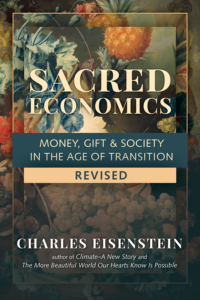The Ascent of Humanity
Chapters
Chapter 4: Money and Property
Alone in a Crowd
It should not be surprising that money is deeply implicated in the dissolution of community, because anonymity and competition are intrinsic to money as we know it. The anonymity of money is a function of its abstraction. The history of money is the history of the gradual abstraction of value from physical objects. Early forms of money possessed intrinsic value, and were distinguished from other objects of intrinsic value by their portability, storability, and universality. Whether camels, bags of grain, or jugs of oil, early media of exchange had an inherent value to nearly every member of the society.
As society specialized and trade flourished, more abstract forms of money developed that depended not on inherent value but on collective belief in their value. Why trade actual bags of grain when you can just trade representations of those bags? Paper money, and to a great extent coinage, depends for its value on collective perceptions rather than practical utility. You can’t eat gold.
The next stage of the abstraction of value came with the divorce of money from even the representation of physical objects. With the abandonment of the gold standard in the 20th century, a dollar came to be worth. . . a dollar. Currency has become a completely abstract representation of value; indeed, the abstraction is so complete that it no longer really represents anything at all. The parallel with language is uncanny. Just as words have lost their mooring in the reality of our senses, “forcing us into increasingly exaggerated elocutions to communicate at all,” so also has money become not just a representation of value but value itself. The last thirty years have witnessed the final step of this abstraction: the gradual elimination of physical currency altogether in favor of numbers in a computer.
Just as words increasingly mean nothing at all, money is also nearing a crisis in which, so disconnected from the utilitarian objects it once represented, it becomes nothing more than hunks of metal, pieces of paper, and bits in a computer. Our efforts to stave off this eventuality (of hyperinflation and currency collapse) mirror the logic of the technological fix, postponing the day of reckoning.
Money is abstract not only with regard to objects of utility, but also with regard to people. Anybody’s money is the same. While camels or jugs of oil or any tangible object has an individuality connected with its origin, money is completely generic and thus completely anonymous. Nothing in the digits of your savings account statement tells you who that money came from. One person’s money is as good as another’s. It is no accident that our society, based increasingly on money, is also increasingly a generic and anonymous society. Money is how the society of the Machine enacts the standardization and depersonalization implicit in its mass scale and division of labor. But more than just a means to implement depersonalization, money also pushes it further.
To see how, let us return to the paradise of financial independence, ignoring for now that the security it promises is but a temporary illusion, and instead look at the results when it is actually achieved. Often, it is when the semblance of independence is achieved that its emptiness becomes most apparent. Simply observe that the financially independent individual, among other equally independent individuals, has no basis for community except for the effort to “be nice” and “make friends”. Underneath even the most well-motivated social gathering is the knowledge: We don’t really need each other. Contemporary parties, for example, are almost always based on consumption—of food, drink, drugs, sports, or other forms of entertainment. We recognize them as frivolous. This sort of fun really doesn’t matter, and neither do the friendships based on fun. Does anybody ever become close by partying together?
Actually, I don’t think that joint consumption is even fun. It only passes the time painlessly by covering up a lack, and leaves us feeling all the more empty. The significance of the superficiality of our social leisure becomes apparent when we contrast that sort of “fun” with a very different activity, play. Unlike joint consumption, play is by nature creative. Joint creativity fosters relationships that are anything but superficial. But when our fun, our entertainment, is itself the object of purchase, and is created by distant and anonymous specialists for our consumption (movies, sports contests, music), then we become consumers and not producers of fun. We are no longer play-ers.
Play is the production of fun; entertainment is the consumption of fun. When the neighbors watch the Superbowl together they are consumers; when they organize a game of touch football (alas, the parks are empty these days) they are producers. When they watch music videos together they consume; when they play in a band they produce. Only through the latter activity is there the possibility of getting to know each other’s strengths and limitations, character and inner resources. In contrast, the typical cocktail party, dinner party, or Superbowl party affords little opportunity to share much of oneself, because there is nothing to do. (And have you noticed how any attempt to share oneself in such settings seems contrived, uncomfortable, awkward, inappropriate, or embarrassing?) Besides, real intimacy comes not from telling about yourself—your childhood, your relationships, your health problems, etc.—but from joint creativity, which brings out your true qualities, invites you to show that aspect of yourself needed for the task at hand. Later, when intimacy has developed, telling about oneself may come naturally—or it may not even be necessary.
Have you ever wondered why your childhood friendships were closer, more intimate, more bonded than those of adulthood? At least that’s how I remember mine. It wasn’t because we had heart-to-heart conversations about our feelings. With our childhood friends we felt a closeness that probably wasn’t communicated in words. We did things together and created things together. From an adult’s perspective our creativity was nothing but games: our play forts and cardboard box houses and pretend tea parties and imaginary sports teams and teddy bear families were not real. As children, though, these activities were very real to us indeed; we were absolutely in earnest and invested no less a degree of emotion in our make-believe than adults do in theirs.
Yes, the adult world is make-believe too. Roles and costumes, games and pretenses contribute to a vast story. When we become aware of it, we sense the artificiality of it all and feel, perhaps, like a child playing grown-up. The entire edifice of culture and technology is built on stories, composed of symbols, about how the world is. Usually we don’t notice; we think it is all “for real”. Our stories are mostly unconscious. But the new edifice that will rise from the ruins of the old will be built on very different stories of self and world, and these stories will be consciously told. We will go back to play.
As children the things we did together mattered to us. To us they were real; we cared about them intensely and they evoked our full being. In contrast, most of the things we do together as adults for the sake of fun and friendship do not matter. We recognize them as frivolous, unnecessary, and relegate them to our “spare time”. A child does not relegate play to spare time, unless forced to.
I remember the long afternoons of childhood when my friends and I would get totally involved in some project or other, which became for that time the most important thing in the universe. We were completely immersed, in our project and in our group. Our union was greater than our mere sum as individuals; the whole was greater than the sum of the parts. The friendships that satisfy our need for connection are those that make each person more than themselves. That extra dimension belongs to both partners and to neither, akin to the “fifth voice” that emerges in a barbershop quartet out of the harmonics of the four. In many of my adult relationships I feel diminished, not enlarged. I don’t feel like I’ve let go of boundaries to become part of something greater than my self; instead I find myself tightly guarding my boundaries and doling out only that little bit of myself that is safe or likeable or proper. Others do the same. We are reserved. We are restrained.
Our reservedness should not be too surprising, because there is little in our adult friendships that compels us to be together. We can get together and talk, we can get together and eat and talk, we can get together and drink and talk. We can watch a movie or a concert together and be entertained. There are many opportunities for joint consumption but few for joint creativity, or for doing things together about which we care intensely. At most we might go sailing or play sports with friends, and at least we are working together toward a common purpose, but even so we recognize it as a game, a pastime. The reason adult friendships seem so superficial is that they are superficial. The reason we can find little to do besides getting together and talking, or getting together to be entertained, is that our society’s specialization has left us with little else to do. Thus the teenager’s constant refrain: “There’s nothing to do.” He is right. As we move into adulthood, in place of play we are offered consumption, in place of joint creativity, competition, and in place of playmates, the professional colleague.[1]
The feeling “We don’t really need each other” is by no means limited to leisure gatherings. What better description could there be of the loss of community in today’s world? We don’t really need each other. We don’t need to know the person who grows, ships, and processes our food, makes our clothing, builds our house, creates our music, makes or fixes our car; we don’t even need to know the person who takes care of our babies while we are at work. We are dependent on the role, but only incidentally on the person fulfilling that role. Whatever it is, we can just pay someone to do it (or pay someone else to do it) as long as we have money. And how do we get money? By performing some other specialized role that, more likely than not, amounts to other people paying us to do something for them. This is what I call the monetized life, in which nearly all aspects of existence have been either converted to commodities or assigned a financial value.
The necessities of life have been given over to specialists, leaving us with nothing meaningful to do (outside our own area of expertise) but to entertain ourselves. Meanwhile, whatever functions of daily living that remain to us are mostly solitary functions: driving places, buying things, paying bills, cooking convenience foods, doing housework. None of these demand the help of neighbors, relatives, or friends. We wish we were closer to our neighbors; we think of ourselves as friendly people who would gladly help them. But there is little to help them with. In our house-boxes, we are self-sufficient. Or rather, we are self-sufficient in relation to the people we know but dependent as never before on total strangers living thousands of miles away.
Times of crisis still can bring us closer to our neighbors. When a health crisis renders us unable to perform the simple functions of daily survival, or a natural disaster or social crisis ruptures the supplies of food, electricity, and transportation that make us dependent on remote strangers but independent of our neighbors, we are glad to help each other out. Reciprocal relationships quickly form. But usually, we don’t help out our neighbors very much because there is nothing to help them with.
For the typical surburbanite, what is there to do with friends? We can cook together for fun, but we don’t need each other’s help in producing food. We don’t need each other to create shelter or clothing. We don’t need each other to care for us when we are sick. All these functions have been given over to paid specialists who are generally strangers. In an age of mass consumption, we don’t need each other to produce entertainment. In an age of paid childcare, we hesitate to ask each other for help with the children. In the age of TV and the Internet, we don’t need each other to tell us the news. In fact, not only is there little to do together, there is equally little to talk about. All that is left is the weather, the lawn, celebrities and sports. “Serious” topics are taboo. We can fill up our social gatherings with words, it is true, but we are left feeling empty, sending those words into an aching void that words can never fill.
And so we find in our culture a loneliness and hunger for authenticity that may well be unsurpassed in history. We try to “build community,” not realizing that mere intention is not enough when separation is built into the very social and physical infrastructure of our society. To the extent that this infrastructure is intact in our lives, we will never experience community. Community is incompatible with the modern lifestyle of highly specialized work and complete dependence on other specialists outside that work. It is a mistake to think that we live ultra-specialized lives and somehow add another ingredient called “community” on top of it all. Again, what is there really to share? Not much that matters, to the extent that we are independent of neighbors and dependent on faceless institutions and distant strangers. We can try: go meet the neighbors, organize a potluck, a listserve, a party. Such community can never be real, because the groundwork of life is already anonymity and convenience.
When we pay professionals to grow our food, prepare our food, create our entertainment, make our clothes, build our houses, clean our houses, treat our illnesses, and educate our children, what’s left? What’s left on which to base a community? Real communities are interdependent.
Now we have reached the sinister core of financial independence: it tends to isolate us in a world of strangers. It is strangers whom we pay to perform the functions listed above. It doesn’t really matter who grows your food—if they have a problem, you can always pay someone else to do it. This phrase encapsulates much about our modern society. When all functions are standardized and narrowly defined, it does not matter too much who fills them. We can always pay someone else to do it. As an individual, it is hard not to feel dispensable, a cog in the machine. We feel dispensable because, in terms of survival, in terms of all the economic functions of life, we are dispensable.
If you buy food from the supermarket deli, the people behind the kitchen doors, whom you never meet, are dispensable. If they quit, even if they die, someone else can be hired to fill their role. The same goes for the laborers in Indonesia who make the clothes you buy at the superstore. The same goes for the engineers who design your computer. We rely on their roles, their functions, but as individual humans they are expendable. Maybe you are a nice, friendly person who actually exchanges friendly greetings with the cashier who’s worked for five years at the local supermarket, but while you may be dependent on her role, the specific person filling this role is unimportant. It does not really matter if you get along with this person, or even know her name. She could be fired or die and it would make little difference in your life. It would not be much of a loss. Unless you live in a very small town, you probably will never know what happened to her or ever think to ask. All the more so for the vast majority of the people who sustain our material lives. They, unlike cashiers, are utterly faceless to us.
Because the economy depends on our roles, but does not care which individuals fill these roles, we suffer an omnipresent anxiety and insecurity borne of the fact that the world can get along just fine without us. We are easily replaced. Of course, for our friends and loved ones—people who know us personally—we are irreplaceable. But with the increasingly fine division of labor and mass scale of modern society, these are fewer and fewer, as more and more social functions enter the monetized realm. Thus we live in fear, anxiety, and insecurity, and justifiably so, because we are easily replaceable in the roles we perform to earn money.
We can get along fine without you. We’ll just pay someone else to do it.
[1] We might become friends with our professional colleagues, especially to the extent we are devoted to a common cause. However, the possibility of workplace friendship is poisoned by the preeminence of money as the main motivating factor in our work. And personal gain is not a common cause. On the contrary, all too often workers must compete for promotion, tenure, or other benefits. Since money is the primary motivation sending people to work, to make money naturally supersedes any joint creation as the primary goal of that work. Workplace friendships are therefore often highly qualified.






